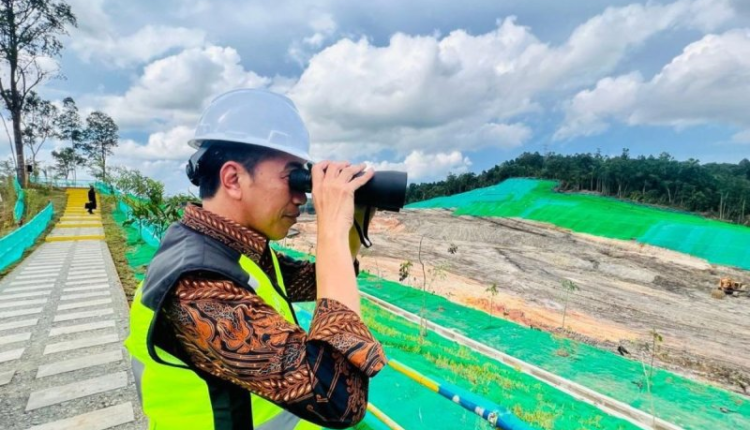The Development of the Jokowi Era is Enjoyed by All Layers of Society
By: Gavin Asadit
The government of Joko Widodo (Jokowi) during its two terms has focused on development aimed at reaching all layers of society across Indonesia. One of the most prominent policies is the massive and equitable infrastructure development. This infrastructure development program is not only limited to Java Island but is also being expanded beyond Java. However, the government continues to make maximum efforts for other regions, including Papua. Until now, Papua has often been seen as an area that has frequently been marginalized in national development programs during previous administrations. During President Jokowi’s term, all layers of society have been able to enjoy the positive impacts of development, particularly in the economic aspects within the community.
Infrastructure such as toll roads, bridges, airports, and ports has been built and expanded in various regions of Indonesia. This has had a significant impact on mobility and connectivity between regions, which were previously difficult to access due to limited infrastructure. For example, with the existence of toll roads connecting various cities on the island of Java, the travel time that used to take dozens of hours can now be shortened to just 4-6 hours. This development allows for faster and easier access, not only for the benefit of the local community but also in supporting economic sectors such as trade and tourism.
The successes and achievements of development under Jokowi’s administration are acknowledged by many. Member of Commission X of the Indonesian House of Representatives, Robert J Kardinal, stated that President Jokowi has built well, especially in terms of infrastructure throughout Indonesia over the past 10 years. The development carried out by the government during President Jokowi’s leadership can truly be enjoyed by all layers of society. Infrastructure programs during President Jokowi’s era have been implemented effectively, thereby aiding in the development and improvement of the community’s economy.
One concrete example of equitable development is Jokowi’s attention to Papua. One of the policies that has been most beneficial for the people of Papua is the one-price fuel policy, which allows fuel prices in Papua to be the same as in other regions of Indonesia. Before this policy was implemented, fuel prices in Papua were much higher, resulting in a high cost of living and difficult access to basic necessities. With this policy, the people of Papua are experiencing significant improvements in their quality of life and access to daily necessities. Additionally, infrastructure development in Papua also includes roads, bridges, and other public facilities, which strengthen connectivity between remote areas in the province. This policy not only accelerates the distribution of goods and services but also supports local economic growth by opening up more opportunities for industrial and trade development in the region.
Furthermore, from a number of efforts made by President Jokowi, Member of Commission XI of the Indonesian House of Representatives, Willy Aditya, appreciated the achievements that President Jokowi has made during his leadership, one of the most extraordinary being the development of the National Capital (IKN) Nusantara.
The development of the new capital city is one of the visionary projects being implemented during the Jokowi era. The relocation of the capital from Jakarta to East Kalimantan is not just about physical relocation, but also a strategic effort to promote equitable development outside of Java. Until now, development in Indonesia has often been concentrated on the island of Java, while regions outside of Java have received less attention. With the establishment of the new capital city, it is hoped that equitable development can be more realized, especially in Kalimantan, which has so far been less impacted by national development.
However, infrastructure is not the only achievement of Jokowi. In the legislative sector, several important breakthroughs have also been achieved, one of which is the Omnibus Law. This law aims to simplify complex regulations and accelerate investment and economic development. Although the Omnibus Law has faced both support and opposition, its effectiveness in streamlining bureaucracy and economic regulations is recognized as a significant step in promoting national economic growth. The simplification of these regulations, alongside infrastructure development, has helped accelerate the licensing process, attract more investors, and create new jobs across various sectors.
The Jokowi administration has also succeeded in reducing regional disparities by prioritizing infrastructure development in previously underdeveloped areas. This is demonstrated by the construction of roads, bridges, and ports in the eastern region of Indonesia, which had previously often been isolated and difficult to access. With better infrastructure, these areas can now connect more effectively with major economic centers, thereby having a positive impact on the local economy.
Although Jokowi’s achievements in infrastructure and legislation have received much praise, there are still several challenges that need to be addressed. The homework that still needs to be completed includes improving the quality of infrastructure project implementation in several areas, especially in regions that still require further improvement. For example, in Papua, the quality of some infrastructure projects, such as national roads, still needs to be enhanced to be more durable and truly provide long-term benefits for the local community.
The development during Jokowi’s era has had a significant impact on all layers of society in Indonesia. With a focus on equitable infrastructure development and legislative reform, Jokowi has successfully steered Indonesia towards a better direction, although challenges still remain. The infrastructure built during his administration is expected to continue serving as a foundation for more inclusive and equitable economic growth in the future.
The writer is an observer of social and community issues.
